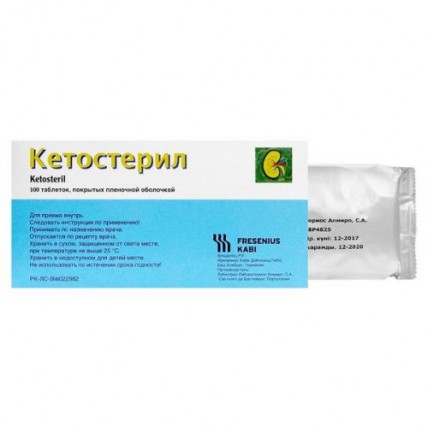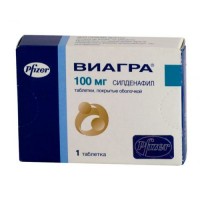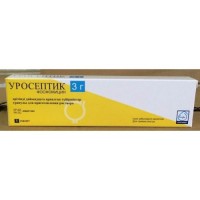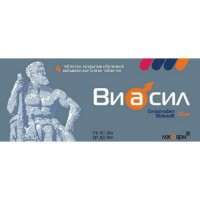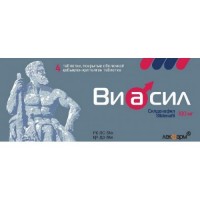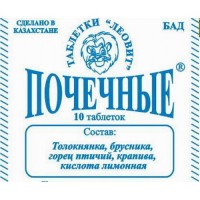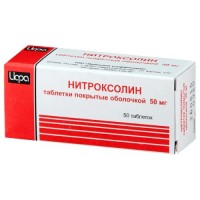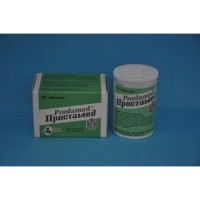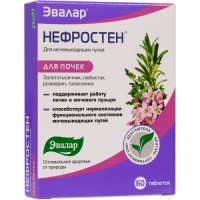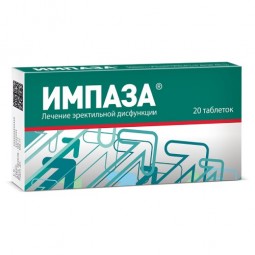Ketosteril 100 film-coated tablets
- $175.00
What is Ketosteril?
Ketosteril is a medication designed to supplement amino acids for individuals with chronic kidney disease, especially those with reduced glomerular filtration rates.
It helps manage protein-energy malnutrition and prevent complications associated with altered protein metabolism.
This supplement is commonly used in patients who need to follow a low-protein diet.
What is the composition of Ketosteril?
Each Ketosteril tablet contains a variety of active ingredients that are essential for supporting protein metabolism in individuals with chronic kidney disease.
These active substances are ketoanalogues and amino acids, which help reduce the burden on the kidneys while ensuring proper nutritional intake.
Below is a detailed breakdown of the components in each tablet:
Active Ingredients:
Isoleucine alpha-ketoanalogue (DL-methyl-oxo-2-calcium valerinate) – 67 mg
This component is a ketoanalogue of isoleucine, an essential amino acid that helps the body synthesize proteins without increasing the nitrogen load on the kidneys.Leucine alpha-ketoanalogue (methyl-4-oxo-2-calcium valerinate) – 101 mg
Leucine is an essential amino acid that supports muscle tissue and protein synthesis, playing a role in energy production, particularly important for patients on a low-protein diet.Phenylalanine alpha-ketoanalogue (oxo-2-phenyl-3-calcium propionate) – 68 mg
Phenylalanine is vital for the production of neurotransmitters. The ketoanalogue form helps to manage phenylalanine levels in patients with impaired kidney function.Valine alpha-ketoanalogue (methyl-oxo-2-calcium butyrate) – 86 mg
Valine is another essential amino acid important for muscle growth and tissue repair. In its ketoanalogue form, it supports protein metabolism with a lower nitrogen burden.Methionine alpha-hydroxy analogue (DL-hydroxy-2-calcium methylbutyrate) – 59 mg
Methionine plays a role in various metabolic processes, including detoxification and synthesis of other amino acids. The ketoanalogue form aids in reducing the uremic load.L-Lysine acetate (equivalent to 105 mg of L-lysine) – 75 mg
Lysine is crucial for tissue repair and growth. It helps form collagen and supports the body's immune system. This amino acid is essential, meaning the body cannot produce it on its own, requiring supplementation in kidney disease patients.L-Threonine – 53 mg
Threonine is involved in protein balance and supports the production of elastin and collagen. It also aids in liver function and fat metabolism.L-Tryptophan – 23 mg
Tryptophan is an amino acid necessary for the production of serotonin, a neurotransmitter that regulates mood and sleep. In patients with chronic kidney disease, it helps balance essential amino acids.L-Histidine – 38 mg
Histidine is required for the growth and repair of tissues, as well as for the production of red blood cells and hemoglobin.L-Tyrosine – 30 mg
Tyrosine is important for the production of dopamine, norepinephrine, and epinephrine, which are critical for stress response and mood regulation.
Inactive Ingredients:
- Corn starch – used as a binder to hold the tablet together.
- Crospovidone – facilitates the tablet's disintegration in the digestive system for better absorption.
- Talc – used as a lubricant to prevent tablet components from sticking during manufacturing.
- Colloidal silicon dioxide (anhydrous) – helps with the flow of tablet ingredients during manufacturing.
- Magnesium stearate – another lubricant used to ensure smooth tablet formation.
- Macrogol 6000 – serves as a plasticizer to maintain tablet consistency.
Film-Coating:
- Talc – included in the coating for a smooth finish.
- Macrogol 6000 – used to give the coating flexibility.
- Quinoline yellow (E104) – a yellow dye that gives the tablets their distinctive color.
- Butylated methacrylate copolymer (Eudragit E 12.5) – helps form the protective coating around the tablet.
- Triacetin – a plasticizer used in the film coating to ensure tablet durability.
- Titanium dioxide (E171) – a whitening agent used in the film coating.
Total Calcium Content:
Each tablet contains 50 mg of calcium, which is an important factor to consider, especially in patients at risk of hypercalcemia.
When is Ketosteril used?
Ketosteril is primarily indicated for the prevention and treatment of protein-energy malnutrition, which is often caused by an altered protein metabolism in individuals with chronic kidney disease. It is especially beneficial for patients with a glomerular filtration rate (GFR) below 25 ml/min, although it may also be used when GFR is higher. The supplement supports nutritional needs when protein intake must be limited.
Who should not use Ketosteril?
Before starting Ketosteril, it is important to consider any contraindications. People with the following conditions should avoid using this medication:
- Hypersensitivity to the active ingredients or excipients
- Hypercalcemia (high calcium levels)
- Amino acid metabolism disorders
- Phenylketonuria (due to phenylalanine content)
- Pregnant or breastfeeding women
- Children and adolescents under 18 years
What precautions should be taken?
Ketosteril should be taken with food to enhance absorption and conversion into amino acids. Regular monitoring of serum calcium levels is crucial during treatment, as well as ensuring that the patient’s diet provides sufficient calories to support overall health. In rare cases, allergic reactions may occur in individuals sensitive to the ingredients.
Can Ketosteril interact with other medications?
Yes, Ketosteril can interact with other medications, particularly those containing calcium. This may increase serum calcium levels. The dose of aluminum hydroxide, often used to manage kidney disease symptoms, may need to be reduced during treatment. Ketosteril should not be taken at the same time as medications that form insoluble compounds with calcium, such as tetracyclines, quinolones, or iron-containing supplements. A two-hour gap between these medicines is recommended to avoid interference with absorption.
Are there any special warnings?
Use in children
Ketosteril is not recommended for use in children and adolescents under 18 years due to a lack of data on its safety and effectiveness in this age group.
Use during pregnancy or breastfeeding
There is insufficient data on the use of Ketosteril during pregnancy or lactation, so its use is not recommended for these individuals.
Effect on driving or operating machinery
Ketosteril does not impair the ability to drive or operate machinery.
How should Ketosteril be taken?
For adults, the usual dose is 4-8 tablets, taken three times daily during meals.
The tablets should be swallowed whole without chewing.
The medication should be taken continuously when GFR is below 25 ml/min, along with a protein-restricted diet (less than 40 g/day) based on the degree of kidney dysfunction.
What should be done in case of overdose?
No specific cases of overdose with Ketosteril have been reported.
However, if an overdose is suspected, it is important to seek medical attention.
What are the possible side effects of Ketosteril?
Common side effects (affecting 1 in 100 to 1 in 10 people) include:
- Rash
- Eczema
- Dermatitis, including contact dermatitis
- Itching
Rare side effects (affecting 1 in 10,000 to 1 in 1,000 people) include:
- Bullous dermatitis
Very rare side effects (affecting fewer than 1 in 10,000 people) include:
- Asthma
- Angioedema
- Hives
- Photosensitivity reactions
In rare instances, hypercalcemia (elevated calcium levels) may occur, in which case reducing vitamin D intake is recommended. If hypercalcemia persists, reducing the dosage of Ketosteril and other calcium-containing products may be necessary.
What should be done if side effects occur?
If any adverse reactions occur while using Ketosteril, it is important to consult a healthcare professional.
In case of severe or persistent side effects, the medication may need to be discontinued or adjusted.
How should Ketosteril be stored?
Ketosteril should be stored in a dry place, away from light, at temperatures below 25°C (77°F).
Keep the tablets out of reach of children.
Do not use the medication beyond the expiration date.
